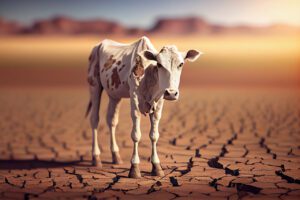It is not in me!
 Pharaoh has two dreams and in the first he was standing by the Nile and in the second he was standing next to a wheat field. Seven fat cows come out of the Nile, where they were probably standing for relief from the heat and the bugs. But right behind the seven fat cows come seven skinny and ugly cows and they eat the fat ones. But, as he would tell Joseph later, when they ate the fats cows, the skinny cows were still skinny. And ugly! In the second dream seven ears of grain are blowing in the breeze, fat and happy, when seven skinny ears, come along and they are nasty looking, blighted by the blistering desert wind. And they throw down on the seven plump ears, licking their glutenous chops and belching happily.
Pharaoh has two dreams and in the first he was standing by the Nile and in the second he was standing next to a wheat field. Seven fat cows come out of the Nile, where they were probably standing for relief from the heat and the bugs. But right behind the seven fat cows come seven skinny and ugly cows and they eat the fat ones. But, as he would tell Joseph later, when they ate the fats cows, the skinny cows were still skinny. And ugly! In the second dream seven ears of grain are blowing in the breeze, fat and happy, when seven skinny ears, come along and they are nasty looking, blighted by the blistering desert wind. And they throw down on the seven plump ears, licking their glutenous chops and belching happily.
When the Pharaoh woke up, he was deeply troubled in his spirit and probably keeping one eye peeled for any maniacal cows coming through his bedroom door. He doesn’t know what in the world this dream could possibly mean, but to his credit he understands that it means something. God was not going to let him miss that. So the Pharaoh calls for the people he would consult on such matters: the magicians and the wise men. The word Moses used in Genesis 41 referred to people who were experts in Egypt in handling spells and using magic and, in this case, studying the volumes of literature available on dreams. It’s interesting to me that more than 400 years later, another Pharaoh would summon his magicians to the banks of the same Nile river that Moses and Aaron had just turned to blood.
But for this Pharaoh, the magicians and the wise men had no answer to him about his dreams. I love the last part of verse 8: “But there was none who could interpret them to Pharaoh.” Now, dear readers, don’t miss this. The Pharaohs of Egypt were considered the mediator between the people and the gods when they were alive. When the Pharaohs died, they were worshiped as gods themselves who had now become divine and had passed on their sacred powers to the new Pharaoh, their son. So? Well, here is this Pharaoh who supposedly has a direct line to the gods of Egypt, but he cannot understand his dream, and neither can his dream experts. Only one can interpret it, the one who has, as the Pharaoh will proclaim later, the “Spirit of God” in him. Kings and rulers and governors and congresses and houses of Parliament cannot understand the sovereignty of God over all the affairs of his creation. Only those who have the Spirit of God and to whom he reveals his plans and purposes.
The Pharaoh greets this young Hebrew stranger, fresh out of prison, with high praise, and three times he says “you.” “I have heard it said of you that when you hear a dream you can interpret it.” Joseph’s response was not to shrug and say, “Well, you know, some guys got it, and some don’t.” No. He corrects the Pharaoh, a dangerous thing to do. “It is not in me,” he says, and that phrase is a single word in Hebrew! NO! It is not I who can interpret dreams. We see the humility of Joseph here, and that humility rests upon his great faith in Almighty God and produces courage. Joseph is not afraid to speak the truth to a man who has authority, but not ultimate authority, over his life. I am reminded of Proverbs 28:1, “The wicked flee when no one pursues, but the righteous are bold as a lion.”
In the final analysis of Genesis 41, the Pharaoh seems to understand that he and his nation are not his at all. No matter how powerful and how prosperous a nation or kingdom on the earth becomes, that nation and that kingdom is absolutely and totally under the control of the sovereign God, the one who created the universe. And we as believers can and should rejoice in that.
